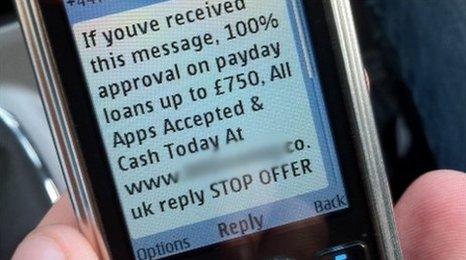Complaints relating to spam text messages increase
- Published

There has been a rise in the number of complaints about spam text messages.
The Information Commissioner's Office (ICO) received 618 complaints about them between April 2010 and April 2011.
That number has increased to 1008 in just the last five months which the ICO says is only the tip of the iceberg.
Research for the Direct Marketing Association suggests more than eight million spam texts, offering anything from insurance claims to loans, are sent out every day.

Dan Vickery was forced to get a new mobile phone because he was being sent 5 or 6 spam texts everyday.
Dan Vickery, a sales rep from Surrey, received a barrage of messages while his grandmother was sick in hospital.
"It started off with one or two spam texts and escalated to five or six and sometimes even ten a day.
"My Nan was ill in hospital at the time so I couldn't turn my phone off."
Things got so bad that Dan not only had to get a new mobile phone but ended up paying out a lot of money too.
'Murky world'
"It resulted in me having to go out and get a new contract at great expense to myself just to get rid of something that I didn't want in the first place".
Simon Entwhistle works for the Information Commissioner's Office and says spam text message senders operate in a legal grey area.
"It's a pretty murky world.
"The reason that people do this is to make money.
"They send out text messages using sophisticated computer equipment buying untraceable SIM cards.
"If they send out 100 texts and one person replies that's some money made for them.
"They can sell that one claim on, times that by a million they can make a lot of money out of this business."
Sending out spam texts is not a criminal offence but it does break the Privacy and Electronic Communication Regulations which are part of European legislation.
That covers electronic marketing and means any company wanting to legitimately send out text messages must have the recipient's consent to do so.
The ICO says people who don't want to receive spam texts should be careful about giving their mobile phone number out.
They also say that the best way to avoid getting them is not to reply to any spam messages they get.
If people keep receiving texts they should get in touch with their mobile provider first or complain directly to the ICO.
Follow our technology reporter Dan Whitworth on Twitter, external